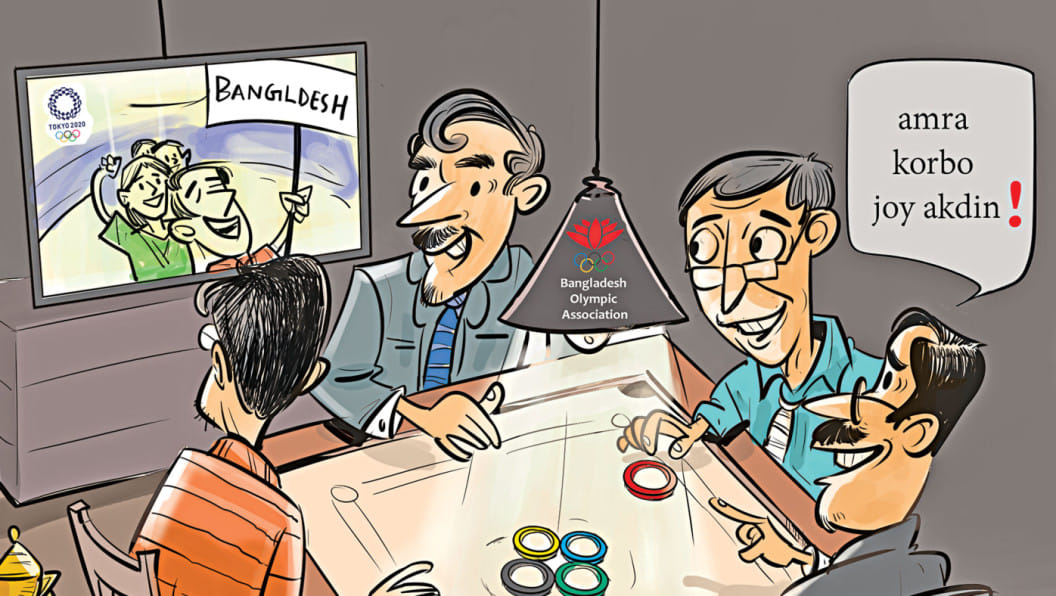Will Bangladesh ever realise its Olympics dream?

San Marino, a country with a population of only 34 thousand, Burkina Faso (20.90 million) and Turkmenistan (61.13 million), all three have erased their names from the awkward list of the countries that never won a single Olympic medal. Whereas Bangladesh, a country with 163 million population, are still carrying the tag of the most populous yet unsuccessful nation in the Olympics history, following yet another barren campaign in Tokyo, their tenth overall.
For the last 36 years since its maiden appearance in the Los Angeles Olympics in 1984, Bangladesh had only token-participated at the Olympics and kept gathering experience while neighbouring nations like India, Pakistan and Sri Lanka registered their names into the Olympic medal-count list long ago. This edition of Olympics saw India grab seven medals, including one gold.
So far and not so good, some 44 athletes from Bangladesh participated in six disciplines – athletics, swimming, shooting, archery, gymnastics and golf -- with no remarkable performances to show. And to add insult to injury, in most cases, the athletes could not even match their individual best scores at the Games.
Bangladesh's highlights at the Olympics are involved with golfer Siddiqur Rahman and archer Ruman Sana, who featured in the 2016 Rio Olympics and 2020 Tokyo Olympics respectively, based on their own merit. The rest of the athletes however, could only participate through wild card entry due to the courtesy of the International Olympic Committee (IOC) in the spirit of Olympics values that focuses on inclusivity from all the nations.
Although it would have been difficult to find one optimistic person who was willing to bet on the Bangladeshi athletes to win a medal at the Games this time but the Tokyo Olympics witnessed a new record of 93 nations -- the largest list of medal-winning countries at any Olympic Games in history -- to enter the medal-distribution podium.
Obviously, a world-class sporting infrastructure, which only the developed countries can establish and sustain, is the key to Olympics success however, in this day and age, utilisation of the rapidly evolving field of sports science is not confined to only the developed nations, rather the smaller nations are reaping rewards from it. Focusing on -- creative coaching methods, collaboration and exchange of ideas among nations and on gender inclusivity -- has proven to be the supporting key factors throughout history.
It is true that an increased number of athletes qualifying for the Olympics directly raise the probability of winning a medal for a nation but the apparent faulty system with no long-term plans that derives sub-standard training facilities, coaches, with little focus in maintaining mental health and financial stability of the athletes, are among the major hindrances in creating world class athletes in Bangladesh.
No doubt, Bangladesh is light-years away from winning an Olympic medal with the athletes from the red and green still struggling in regional South Asian (SA) Games. Even then, the field of archery and shooting has shown vivid glimpses of hope to break the jinx of an Olympic medal. Now based on the impact of the aforementioned sports, the rational thing to do for Bangladesh is to assign priority on these two areas and establish cutting-edge facilities as soon as possible, the likes of which the gold medallists South Korean archers receive. For example, their training grounds happen to be installed with facilities which can create artificial wind and rain among other things, so that Korean archers can adjust in the most precarious conditions during big occasions with relative ease compared to their opponents.
Athletes in Bangladesh at the youth level, especially in the individual events, are generally groomed with the sole motivation to land a job in Services teams like Bangladesh Army, Bangladesh Navy, Bangladesh Air Force or Bangladesh Ansar instead of setting their sights on Olympics glory. This had led to a seemingly mediocre mindset where the Olympics dream stays confined to mere participation in the Games, whereas the thoughts of grabbing a medal stay beyond the wildest of imagination.
Another bitter truth from Bangladesh's context is that the local coaches can only take the athletes to a certain level, after which, the athletes gradually and invariably lag behind when competing against the overseas opponents due to their sub-standard rate of progress. However, there may have been some exceptions where athletes have managed to overcome all odds with just sheer determination and will power.
With Bangladesh still devoid of any proper sports policy, the onus is on the government and the sports federations under it to create a sporting environment coupled with a big enough of a talent pool that will inspire the youth from all over the country to dream and realistically aim for Olympics glory. By properly and sincerely investing in the top-notch training facilities, quality coaches to raise the quality of the overall infrastructure to an approximately world-class level, the elusive dream could still turn true at the upcoming 2024 Paris Olympics. But the clock keeps ticking as ever. And with each passing day, the rest of the nations go further ahead, especially the 69 nations other than Bangladesh who are yet to taste the triumph at the Olympic Games.

 For all latest news, follow The Daily Star's Google News channel.
For all latest news, follow The Daily Star's Google News channel. 



Comments